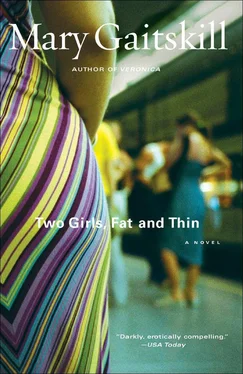Mary Gaitskill - Two Girls, Fat and Thin
Здесь есть возможность читать онлайн «Mary Gaitskill - Two Girls, Fat and Thin» весь текст электронной книги совершенно бесплатно (целиком полную версию без сокращений). В некоторых случаях можно слушать аудио, скачать через торрент в формате fb2 и присутствует краткое содержание. Год выпуска: 2012, Издательство: Simon & Schuster, Жанр: Современная проза, на английском языке. Описание произведения, (предисловие) а так же отзывы посетителей доступны на портале библиотеки ЛибКат.
- Название:Two Girls, Fat and Thin
- Автор:
- Издательство:Simon & Schuster
- Жанр:
- Год:2012
- ISBN:нет данных
- Рейтинг книги:5 / 5. Голосов: 1
-
Избранное:Добавить в избранное
- Отзывы:
-
Ваша оценка:
- 100
- 1
- 2
- 3
- 4
- 5
Two Girls, Fat and Thin: краткое содержание, описание и аннотация
Предлагаем к чтению аннотацию, описание, краткое содержание или предисловие (зависит от того, что написал сам автор книги «Two Girls, Fat and Thin»). Если вы не нашли необходимую информацию о книге — напишите в комментариях, мы постараемся отыскать её.
Review) create a haunting and unforgettable journey into the dark side of contemporary life and the deepest recesses of the soul.
Two Girls, Fat and Thin — читать онлайн бесплатно полную книгу (весь текст) целиком
Ниже представлен текст книги, разбитый по страницам. Система сохранения места последней прочитанной страницы, позволяет с удобством читать онлайн бесплатно книгу «Two Girls, Fat and Thin», без необходимости каждый раз заново искать на чём Вы остановились. Поставьте закладку, и сможете в любой момент перейти на страницу, на которой закончили чтение.
Интервал:
Закладка:
It wasn’t until we were in my room sitting on my bed that she told me that my father wasn’t there, that he didn’t even know what she was doing. I was shocked at this information; my mother had never done anything without my father’s permission. I listened as she went on, tracing an invisible pattern on my bedspread with her finger. She wanted me to come home, she said. Maybe college had been a bad idea, but I should come home. She knew there had been problems at home. She drew her pattern with meticulous care, examining every aspect of it. But still. Home was the place for a young girl. She looked up, smiled wretchedly, and touched my cheek.
“No,” I said. “And you can’t make me.”
Her expression shrank from me. There was silence, and then she came slowly forward again. She repeated what she had said, adding that they would be willing to “get help” for me. She said my father was “half crazy” with worry. I kept saying no, my conviction that she could not force me growing with each repetition of the word. I was of legal age, and Anna Granite was on my side. If my father wanted so badly to see me, he could have hired a detective; he probably didn’t because he was terrified of opening the Pandora’s Box of family counseling.
In the end she gave up. She said she wouldn’t tell my father where I was on the condition that I write to her regularly and tell her how I was doing. I agreed. We had a short conversation about my job and my life. I told her that I was a secretary for an art dealer and that I had made two new friends — this last out of a desire to reassure her that I was happy, for even then I couldn’t be indifferent to the pain I saw her in. She said well, I’m just starving to death and I’d love a grilled cheese sandwich, how about you?
We had a snack at a diner. Our meal was accompanied alternately by bright conversation and my mother’s tears. She chewed and wiped at her eyes, then at her mouth, clearing her throat with ladylike sounds.
Once past the initial resentment, I wrote my regular letters with enthusiasm, inventing bright anecdotes I knew would please her. I think I liked writing the letters because they prevented the development of homesickness and remorse, which might have led me to return home. I liked recounting my pretend successes, knowing my real accomplishments were all the greater. I had fantasies of returning home unexpectedly, after a triumph in banking or industry, dispensing munificence and superiority. They would plead with me to stay with them, just for a few days, but I would have to rush off to a conference or something. I imagined my father looking at me with awe, shamed to realize his judgment of me had been so wrong.
The letters from my mother, also full of anecdotes, were small notations of my old life, memories of chili dinners, the evening news, the sound of electric fans and of marching music, the close, dark rooms of the Painesville house, threads worked into the now vaster tapestry of my complex new life — present but safely contained and circumscribed.
This contact alternately fell off or intensified over the years and was, often at Christmas or Thanksgiving, supplemented by phone conversations. During one of those conversations my father came on the line and without warning began talking to me as if he’d seen me the previous week. It was only minutes before the strength of his voice, resonant with the conviction that what he was doing was perfectly normal, drew me into a conversation. I heard my voice change as I talked to him, become small, soft, constricted — the voice of my childhood. His voice was fat with generosity when he said, “Come home for Christmas next year, okay?” and I said okay even though we both knew I wouldn’t. I hung up feeling disgust and pain and covetousness — covetousness because part of me held onto the pain like it was a precious pet, the favorite stuffed animal I had clutched as a child.
One day I called when my father was alone. He began talking about the neighbors who hated him and the bastards he worked with, how much he’d like to smash their skulls with hammers. There was marching music in the background. I said nothing.
“And then,” he continued, “there’s my selfish bitch daughter. Who wasted my money flunking out of college and then deserted us. Who calls us every few months on her royal whim. My daughter—”
“Yes,” I said, “your daughter who you raped.”
“Raped.” My father spoke furiously. “If you think you were raped, you don’t know what rape is. I’m the one who’s been raped, sister. Raped all my goddamn life by the army, the school system, the bosses, the neighbors—”
I hung up.
For a long time I stopped reading my mother’s letters, and I never wrote to her. When I moved I left no forwarding address, and for a time there was no contact at all. Then came the inevitable reconnection, Christmas cards, a birthday present, a shopping trip with my mother, events like a trail of pebbles leading to that final conversation in Hoboken.
I picked at my misshapen bran muffin while she described my father’s illness and how her days were spent caring for him. From the moment she told me he was seriously ill and might soon die, I felt my own assumption that I would go home to see him plant itself in my solar plexus. I didn’t say anything about it though; I merely listened and asked occasional questions. I could hear in her voice that she shared my assumption that I would come home.
The conversation went on, and I tried to imagine a scene of forgiveness and reconnection. But the stick figures of myself and my father stood mute in the dark rooms of my internal house. I tried to imagine him looking at me with tears in his eyes, speechless with sorrow as he clasped my hand to beg forgiveness. But I could only imagine him with his eyes glassy and glazed, muttering about bastards with his dying breath. “You prick,” I said to him. “You ruined me.” He didn’t hear me.
I looked at my mother. The sentence I had just imagined saying to my father stood between us in full view, but she didn’t see it. She began talking about travel arrangements.
“Mother,” I said. “I don’t want to go.”
She didn’t look surprised. Her body went into its habitual posture of readiness to receive pain, and then I saw her gather herself to argue with me. She began with the “difficulties” between my father and me. We talked round the fact of what happened; I felt angrier and angrier. I backed away from my feelings, using the conversation to parry and evade them. Unknowing, my mother cornered me, stripping away my defenses as fast as I could secure them. My feelings pressed against my control like the fists and feet of a baby trying to punch free of the womb.
We paused for a moment. There was a light sweat on my forehead. A thin layer of composure constrained my anger. If she had remained silent only a little longer, the layer might have thickened enough to protect us both, but she said, at that fragile moment: “Can’t you be big enough to forgive him, Dotty? Can’t you stop thinking of your problems just this one time?”
Her face recoiled from my expression, she put her hand to her throat as though in self-protection, and then my words garrotted her. “No, mother,” I said, “no I can’t forget about my problems. Because my problems are that my father did everything but fuck me, again and again. You know, incest? You watch television, don’t you?”
Her face confirmed my worst fear; she was not surprised by what I’d said, but wounded to the death that I’d said it. Ashy noise rose and died in her throat, and she collapsed on the table like the weak old woman she was.
Some weeks later, she sent me a card announcing the funeral. I disregarded it. Once or twice I worried if I had made the right decision in not going to see him. Then the worry went into oblivion. My mother and I had not communicated since. I did not even know if she was alive.
Читать дальшеИнтервал:
Закладка:
Похожие книги на «Two Girls, Fat and Thin»
Представляем Вашему вниманию похожие книги на «Two Girls, Fat and Thin» списком для выбора. Мы отобрали схожую по названию и смыслу литературу в надежде предоставить читателям больше вариантов отыскать новые, интересные, ещё непрочитанные произведения.
Обсуждение, отзывы о книге «Two Girls, Fat and Thin» и просто собственные мнения читателей. Оставьте ваши комментарии, напишите, что Вы думаете о произведении, его смысле или главных героях. Укажите что конкретно понравилось, а что нет, и почему Вы так считаете.












